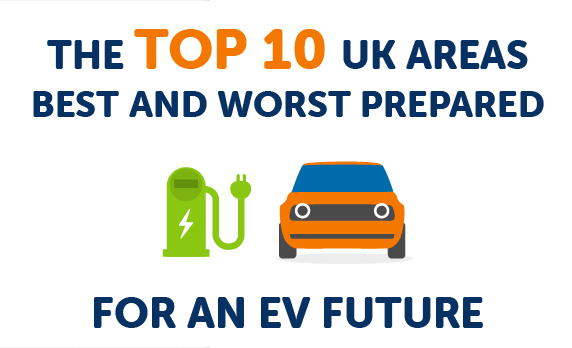Buying an EV or hybrid? 9 things you should know first

Electric vehicles (EVs) and hybrids are here to stay. With the carbon dioxide emissions of an EV being lower than a petrol or diesel engine*, even when taking into account the electricity used for charging, they’re a popular choice for those looking to reduce their carbon footprint. Add in cheaper ongoing running costs and the end of petrol and diesel car manufacturing in 2035, sooner or later a lot of us will be driving them. If you’ve decided to move to an EV, here are some key considerations before you choose which one to buy.
1. Price
For starters, you need to decide what price range you’re looking at. At one end of the spectrum are models like the Tesla Model X, which would cost around £99,000 new. At a more middle-of-the-road price are the likes of the Mercedes-Benz EQA, in the region of £52,000 from new. And at the entry level are cars such as the Nissan Leaf, which you can buy for around £28,000. There are also more EVs to be found on the used car market now, with varying degrees of pricing.
What’s the difference? As with all cars, the spec of an EV can vary a lot, from a simple runaround to a plush executive saloon, and that makes a difference to what you pay. Power is also a factor affecting cost, as is range – a crucial consideration with all EVs.
2. Range
An EV’s range is how far it can take you on a single charge. This is affected by a multitude of factors, such as energy efficiency, power of the motor and temperature conditions, but it largely comes down to the lithium-ion battery and how much charge it can take.
When choosing your EV, you may want to be aware of its range. You need to pay close attention to the car’s battery size, as well as its spec, and even the software it uses (updating software can affect range even with no physical modifications). Some EVs, such as Tesla and Nissan Leaf, offer a choice of different capacity batteries. As these are one of the most expensive components of an EV, it’s important to take this into consideration – if you’re only going to be doing short journeys there’s probably little point splashing out on a higher capacity battery.
The average range for an EV is between 100 and 300 miles, but it isn’t fixed. You can maximise your EV's range by using eco mode (which cuts down on some of the more energy-hungry functions of the car), keeping the weight to a minimum and taking advantage of regenerative braking (which redirects some of the energy used during braking back into the power unit).
3. Power
Closely related to range is power, or performance. The most powerful EVs out there include the Aspark Owl, which can get from 0-60mph in 1.69 seconds and has a top speed of 249mph; or the Rimac Nevera, which can reach 60mph in 1.85 seconds with a top speed of 258mph.
Forgetting the supercars, most EVs are capable of reaching at least 90mph, so are on a par with petrol or diesel vehicles. Ultimately most EVs will have enough power to meet your day-to-day driving needs, but the power of the vehicle is something that could affect the cost of insuring it, so is worth considering.

4. Running cost
Day-to-day running costs are one of the best things about EVs and hybrids. Charging them up is usually a lot cheaper than filling your tank with petrol or diesel.
The price of charging does vary depending on whether you’re using slow, fast or rapid charging. Rapid charging, which is often found on motorways, charges your EV up to 80% in around 20-40 minutes and is the most expensive. Fast charging is a little cheaper but takes a few hours. Slow charging is the cheapest but is best done overnight (especially if you’re on an electricity tariff that costs less at night) or when you’re away from the car all day.
You can easily charge your EV at home, either with a simple plug-in charger for slow charging or a specially installed fast charger. Installing a fast charging port at home costs about £800 - £1,000.
5. Maintenance costs
In many ways, EVs are simpler to maintain than their petrol and diesel counterparts because there are fewer parts to go wrong – no spark plugs, valves or catalytic converter, for example. That means EVs are generally a lot cheaper to maintain than the average petrol or diesel car. Batteries are expected to last 10-20 years and you can also take out battery insurance.
The EV’s computer will tell you when the car needs servicing. This is often at slightly longer intervals than traditional cars; for example, models like the Volkswagen ID.3 and Nissan Leaf need servicing every 18,000 miles, as opposed to the recommended every approx. 10,000 for petrol and diesel cars.
6. Reliability
No car can guarantee absolute reliability, but the simplicity of EVs gives them an advantage over petrol and diesel cars. As well as having fewer components to wear out, features like regenerative braking (which uses the motor to assist braking, giving the brake pads a much-needed rest) help to reduce wear and tear. However, you may go through tyres more quickly due to the increased acceleration that some electric cars offer (particularly more powerful versions).
According to a 2022 survey, the most reliable EVs were the Nissan Leaf (98.9% reliable) and the MG ZS EV (95.5%).

7. Road Tax
Pure EVs are currently exempt from Vehicle Excise Duty (VED), otherwise known as ‘road tax’. Hybrids, however, still have to pay road tax, albeit at a slightly discounted rate due to the fact they give off fewer greenhouse gas emissions. However, from 2025 the UK government is introducing road tax for EVs. Those registered on or after 1 April 2017 will have to pay the standard rate for VED Band B. Those registered on or after 1 April 2025 will pay £10 for the first year, then £165 thereafter.
8. ULEZ and congestion charge
London’s Ultra-Low Emissions Zone (ULEZ) charges drivers of polluting cars £12.50 a day to drive their car within the zone. Bristol and Birmingham have also introduced Clean Air Zones around their city centres, with a charge of £9 or £8 per day respectively to enter for non-compliant vehicles. Edinburgh, Dundee, Aberdeen and Glasgow also have Low Emission Zones planned. EVs, because they create no tailpipe emissions, are exempt from these charges. Until December 2025, EVs that meet the right criteria are also exempt from the congestion charge, the £15 fee for driving within London’s congestion zone. Hybrids, while not exempt, can receive discounts from the charge.
9. Insurance
EVs and hybrids need insuring just like any petrol or diesel car. It’s well worth considering battery cover too, as a faulty battery could cost around £5,000 on average to replace. You can also get additional cover for the power cable. Insurance costs are based on a range of factors including certain characteristics about the vehicle itself, so getting some quotes for the different models you’re considering could be a good idea before you make your final decision.
We hope this guide gives you some things to think about when deciding which EV or hybrid might suit your needs. esure offers insurance for EVs and hybrids – check out our EV insurance.
*Source: www.eea.europa.eu/publications/electric-vehicles-from-life-cycle section 4.2
You might also be interested in
The UK Electric Vehicle revolution
Which UK towns, cities, and regions are best- and worst-prepared for an EV future?
Understanding your car cover and when it applies
Check out our video for top car cover tips.

